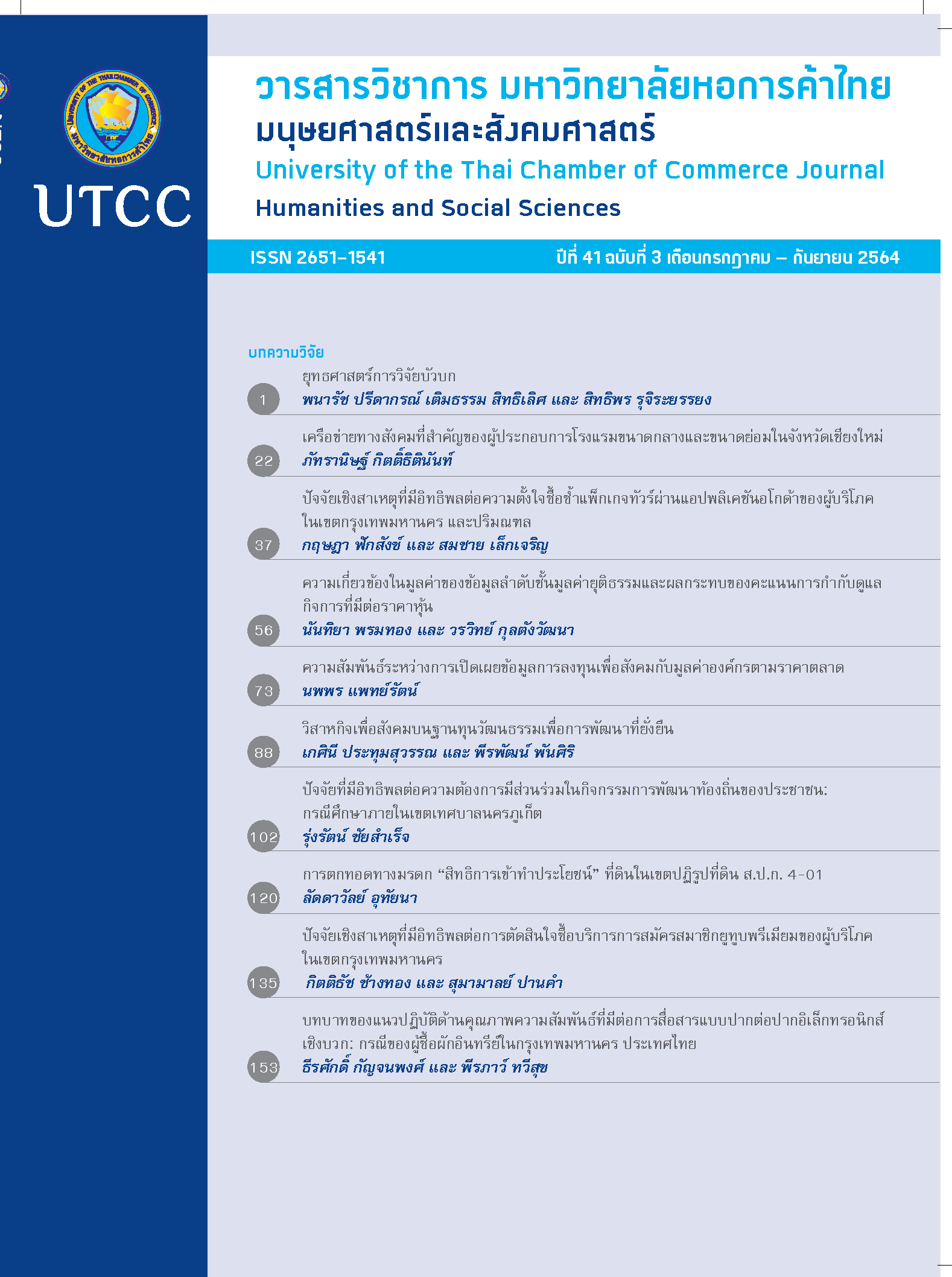The Key Social Ties of Hotel SME Entrepreneurs in Chiang Mai Province
Main Article Content
Abstract
This quantitative research aimed to study the key social ties of hotel SME entrepreneurs in Chiang Mai province and to investigate the relationship between social ties and the size of hotel. The data was collected from 250 SMEs hoteliers or Hotel Entrepreneurs in Chiang Mai province, with the use of questionnaires. The data was analyzed using descriptive statistics and Pearson Chi-square. The result of research reveals that the hoteliers are almost equally female and male, aged mostly between 41-50 years, most of which own the small-sized hotels. They graduated with bachelor degrees in Business Administration and their parents were entrepreneurs. The test result of relationship between social ties and the size of hotel using Pearson Chi-square tests reveals that the type of relationship with the first person and the close relationship with the fourth person are significantly related to the size of hotel at 0.05 and 0.05 respectively.
Article Details

This work is licensed under a Creative Commons Attribution-NonCommercial-NoDerivatives 4.0 International License.
ลิขสิทธิ์ของบทความ
ผลงานที่ได้รับการตีพิมพ์ถือเป็นลิขสิทธิ์ของมหาวิทยาลัยหอการค้าไทย ห้ามมิให้นำเนื้อหา ทัศนะ หรือข้อคิดเห็นใด ๆ ของผลงานไปทำซ้ำ ดัดแปลง หรือเผยแพร่ ไม่ว่าทั้งหมดหรือบางส่วนโดยไม่ได้รับอนุญาตเป็นลายลักษณ์อักษรจากมหาวิทยาลัยหอการค้าไทยก่อน
References
ขวัญปภัสสร จานทอง. (2557). อิทธิพลของปัจจัยภูมิหลัง การมุ่งประกอบการ และเครือข่ายทางสังคม ต่อความสำเร็จทางธุรกิจของผู้ประกอบการจังหวัดราชบุรี. วารสารสมาคมนักวิจัย, 19(1), 123-134.
ดวงพร พุทธวงค์. (2561). ความสำเร็จของการพัฒนาระบบเครือข่ายธุรกิจขนาดเล็กของผู้ประกอบการธุรกิจเสื้อผ้าแฟชั่น. วารสารวิชาการบริหารธุรกิจ, 7(ฉบับพิเศษ), 18-31.
ธนภูมิ อติเวทิน. (2561). Niche, innovation & network: แนวคิดสู่ความสำเร็จของผู้ประกอบการใหม่ยุค 4.0. วารสารสังคมศาสตร์ มหาวิทยาลัยศรีนครินทรวิโรฒ, 21, 320-333.
ธนาคารแห่งประเทศไทย. (2562). ภาวะการทำงานของประชากร จำแนกตามประเภทธุรกิจ. สืบค้นเมื่อ 15 เมษายน 2563, จาก https://www.bot.or.th/App/BTWS_STAT/statistics/ReportPage.aspx?reportID=638&language=th
วรัญญา ธิคม. (2557). ความสัมพันธ์ของการสร้างเครือข่ายและกลยุทธ์การตลาดที่มีอิทธิพลต่อความสําเร็จของผู้ประกอบการในจังหวัดลำปาง. ใน การประชุมวิชาการ การพัฒนาชนบทที่ยั่งยืน ครั้งที่4 ประจำปี 2557 (น.28-34). ขอนแก่น: มหาวิทยาลัยขอนแก่น.
สำนักงานคณะกรรมการพัฒนาการเศรษฐกิจและสังคมแห่งชาติ. (2562). ผลิตภัณฑ์มวลรวมภายในประเทศ. สืบค้นเมื่อ 15 เมษายน 2563, จาก https://www.nesdc.go.th/ewt_dl_link.php?nid=9892&filename=QGDP_report
สำนักงานส่งเสริมวิสาหกิจขนาดกลางและขนาดย่อม. (2562). สถานการณ์ SME ปี 2562. สืบค้นเมื่อ 15 เมษายน 2563, จาก https://www.sme.go.th/th/download.php?modulekey=215
สำนักงานสถิติแห่งชาติ. (2558). การสำรวจการประกอบกิจการโรงแรมและเกสต์เฮาส์ พ.ศ. 2558. กรุงเทพฯ: ผู้แต่ง.
สำนักงานสถิติแห่งชาติ. (2561). การสำรวจที่พักแรม พ.ศ. 2561. สืบค้นเมื่อ 24 กรกฎาคม 2562, จาก http://service.nso.go.th/nso/nso_center/project/search_center/23project-th.htm
Abou-Moghli, A. A., & Al-Kasasbeh, M. M. (2012). Social network and the success of business start-up. International Journal of Business and Management, 7(9), 134-140.
Ardichvili, A., Cardozo, R., & Ray, S. (2003). A theory of entrepreneurial opportunity identification and development. Journal of Business Venturing, 18(1), 105-123.
Cassar, G. (2014). Industry and startup experience on entrepreneur forecast performance in new firms. Journal of Business Venruring, 29(1), 137-151.
Davidsson, P., & Honig, B. (2003). The role of social and human capital among nascent entrepreneurs. Journal of Business Venturing, 18(3), 301-331.
Debrulle, J., Maes, J., & Sels, L. (2014). Start-up absorptive capacity: Does the owner’s human and social capital matter? International Small Business Journal, 32(7), 777-801.
Greve, A., & Salaff, J. W. (2003). Social networks and entrepreneurship. Entrepreneurship Theory and Practice, 28(1), 1-22.
Klyver, K., & Schøtt, T. (2011). How social network structure shapes entrepreneurial intentions? Journal of Global Entrepreneurship Research, 1(1), 3-19.
Krejcie, R. V., & Morgan, D. W. (1970). Determining sample size for research activities. Educational and Psychological Measurement, 30(3), 607-610.
Pfeffer, J., & Salancik, G. R. (1978). The external control of organization : A resource dependence perpective. New York: Harper and Row.
Quan, X. (2012). Prior experience, social network, and levels of entrepreneurial intentions. Management Research Review, 35(10), 945-957.
Ramos-Rodríguez, A. R., Medina-Garrido, J. A., & Ruiz-Navarro, J. (2012). Determinants of hotels and restaurants entrepreneurship: A study using GEM data. International Journal of Hospitality Management, 31(2), 579-587.
Robinson, S., & Stubberud, H. A. (2011). Social networks and entrepreneurial growth. International Journal of Manasement & Information Systems, 15(4), 65-70.
Shane, S. (2003). A general theory of entrepreneurship: The individual-opportunity nexus. Northampton, MA: Edward Elgar.
Witt, P. (2004). Entrepreneurs' networks and the success of start-ups. Entrepreneurship & Regional Development, 16(5), 391-412.


